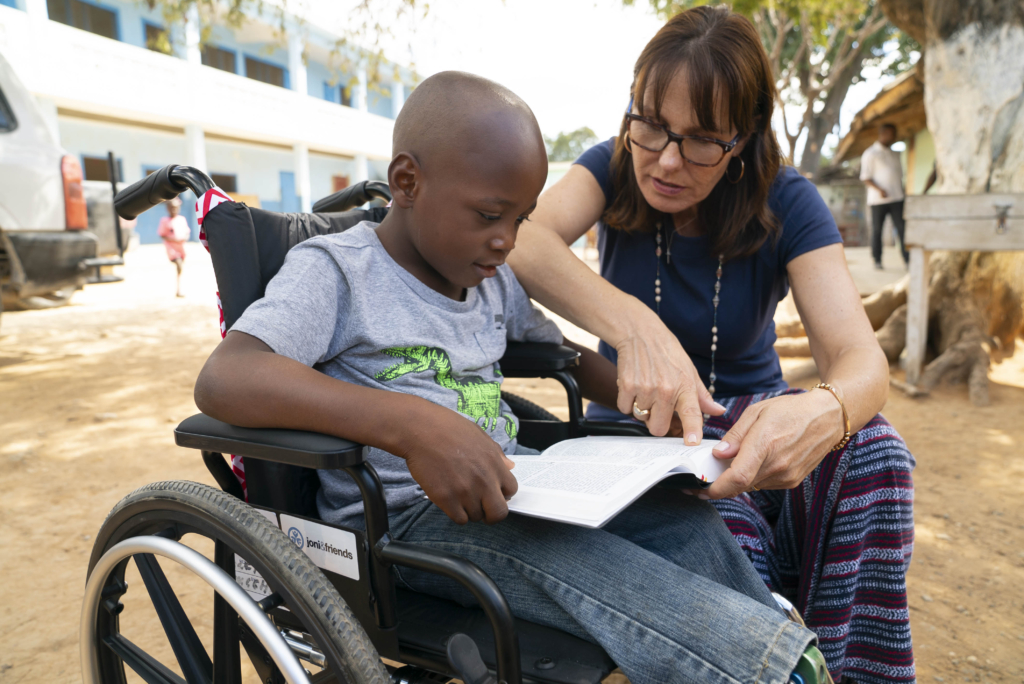Soul Care for People with Disabilities

A desperate need
They’re not growing. Why aren’t more people with disabilities who live in residential care being discipled?1 For a variety of reasons, no one nurtures them toward spiritual growth. Getting to and fitting into church where they could receive discipleship is a major challenge for them. But there are more subtle obstacles. How can we address this challenge?
There’s hope. Christian family, friends, and fellow church members can offer soul care to their loved ones with disabilities when they visit them in residential care. Who better to identify spiritual needs and minister soul care to them on site? If not on site, they can do soul care in other ways such as phone calls or video conferencing, even post or email. They just need to be intentional responding to Jesus’s command.
Jesus prioritizes soul care.
Before Jesus ascended to heaven, he commissioned his disciples to make more disciples. But he left it up to them to determine the best way to “go into all the world,” (Matt. 28:19–20) although it should be a mission from a local church led by the Holy Spirit. How might Jesus’s commission include people with disabilities living in residential care such as nursing homes, group homes, even hospitals?
Soul care, sometimes called spiritual care, counseling, or just discipleship takes Jesus’s commission to people with spiritual needs wherever they are, not just in church. Soul care in all contexts focuses on promoting spiritual growth such as how to live with suffering. How does growth through soul care occur?
Taking soul care to people with disabilities is a mission strategy to reach less-churched people with disabilities. Some missiologists argue that people with disabilities are an un-reached people group. But people with disabilities are not limited to a people group; they are cross sectoral and are present in all people groupings speaking all languages and populating all cultures. They are much larger than an unreached people group. But they are largely un-reached. Let’s ask the questions, who are people with disabilities, what are their needs? and how can we nurture them in spiritual growth?
What is the challenge?
Today, there are an estimated 8+ billion people in the world. A growing 1.3 billion have disabilities. This means that about 1 out of 6 people globally has some form of disability. What is more, about 80 percent live in the majority world where they are even more isolated due to the lack of disability services. So, although they need to grow spiritually, they cannot access the local church and its ministries.
To make matters worse, ‘disability’ is difficult to define because it is broad, complex, and diverse. A person can have a physical, sensory, developmental, or intellectual disability. They can also experience additional mental health challenges often referred to as a dual diagnosis. They might have a combination of disabilities, in varying degrees.
Depending on many factors, people with disabilities may need to live in residential care. The global majority live at home, receive care from their families in a back room, and may seldom leave the room in which they live. Both those in residential care and those restricted to their home can miss out on soul care.
Why can’t they get to church? We once thought the problem was simply transportation. But it is far more complex. Transportation, accessibility, social stigma, and systemic breakdown of disability services are a few of the major hurdles. How can we reach them? I believe it will require lay soul care workers such as Christian friends, fellow church members, and family members.
Why is this mission so important?
Crucially, this is a gap in our mission strategy. For 1.3 billion people, those Christians who visit them may be the only church they will ever experience; although just two people, it may be the only gathering they will ever be part of; finally, it may be the only way that they will hear the Gospel and grow spiritually. This need can hardly be overstated. Yet it is largely unrecognized. Are our churches made up of 1 in 6 people with disabilities mirroring the global statistic? If not, how come?
In general, both locally and globally, people with disabilities are more likely to experience barriers to full inclusion and participation in the church. They need to be encouraged and enabled to be actively involved in church ministry as well as be co-workers in mission. That is why all local churches need to reach out to them, especially to those who can’t leave the residences or back room of a home where they live in isolation.
What will this unique mission require?
First, it will take a local church that sees the importance of this mission and the intentionality to address it. Realistically, pastors and deacons may not have the time to conduct this ministry, at least not on a regular basis which this ministry requires.
Second, this mission will require the support of Christian leaders, pastors, seminary professors, mission leaders… everyone to encourage and support it. No conversation about church ministry, especially planning, should exclude this large and growing portion of the body of Christ.
Finally, and most crucially, this mission will require lay people. Although there are exceptions, church people, particularly family and friends regularly visit people with disabilities in residential care. They are ideally suited to do soul care. What is more, doing soul care may be the way that they love their friend or family member with a disability best.
What can soul care workers do?

What can all believers do to extend soul care to people with disabilities unable to go to church? They can go to the person with a disability wherever they are and minister in the following ways, either as spontaneous individual acts or ideally as a spiritual growth process:
• be present with them. Loneliness can only be resolved with presence. Job’s comforters sat silently with Job seven days before speaking (Job 1:13). What is more, many people with disabilities who live in residential care may suffer extreme isolation more dangerous to their health than smoking.2 Once present . . .
• listen to them. So many people in the lives of people with disabilities talk to them and tell them what to do. This is spirit-stifling. Caring people who genuinely listen are valuable and rare. But listening well requires that the listener ask good questions, then listen carefully to the responses.3 Listening is ministry. Once you have listened to their concerns . . .
• pray for them. Having listened to them describe challenges in their lives, you can ask them if you could pray with them and for them. Many will say ‘yes’ gratefully. Bringing concerns to the Lord naturally leads to hearing what God says about those matters. Because God speaks through his Word . . .
• read Scripture to them. In addition to praying for them about their struggles you can read Scripture to them and with them (let them read) that specifically addresses their challenges.4 People who are suffering need to hear God’s voice by reading God’s Word to them, particularly if they are incapable of reading it on their own. They want to listen to God speak and follow his instruction.5 God encourages them . . .
• encourage them. Having read Bible passages addressing their challenges you can talk with them about how the Scripture applies to them and their specific circumstances. The word ‘encourage’ in Scripture usually applies to encouraging people with the Bible,6 not just a pat on the back. If they don’t have a Bible find one and give it to them as a gift. Many Bibles are inexpensive. Also, depending on the disability and the residential circumstances, audio recordings are an important option. The soul care growth process leads to . . .
• comfort them. True comfort comes through all the ministry actions listed above. Once God encourages people through Scripture, they can experience true comfort and peace. If a person with a disability is truly helped through soul care, we should pray it has a lasting impact. Although new challenges will come, their spiritual growth progress will make life more bearable and manageable.
These are essential soul care activities for people with disabilities, what they want and need. But they are best observed as a complete spiritual growth process. Any believer can do soul care for people with disabilities in residential care, in the back room of a home, or wherever they are.
How should we pray for this mission?

Pray that the Lord will summon lay people— Christian family, friends, neighbors, and fellow church members—to live out their faith by serving as soul care workers to people with disabilities wherever they are. They can be present, listen, pray with, read Scripture, comfort, and encourage people with disabilities toward spiritual growth. Finally, pray that the Lord will stir churches and their leaders to get behind these soul care workers so that they will reach the 1 in 6.
Written By—Dave Deuel, PhD
Dave Deuel is married with four adult children, one daughter has Down syndrome. He also has a sister-in-law who has an intellectual disability. He is Academic Dean Emeritus for the Master’s Academy International, Senior Research Fellow Emeritus and Strategic Alliance SME for the Joni Eareckson Tada Disability Research Center, and Catalyst for the Disability Concerns Issue Network, the Lausanne Movement.
He served as Old Testament professor and department chairman at the Master’s Seminary for 10 years and in pastoral roles of local churches, five of which were church plants. He is currently elder for pulpit and interim pastor for area local churches in upstate New York.
[1] Liu, Eleanor X; Carter, Erik W; Boehm, Thomas L; Annandale, Naomi H; Taylor, Courtney E. Their Own Words: The Place of Faith in the Lives of Young People with Autism and Intellectual Disability. Intellectual and Developmental Disabilities 52.5 (October 2014): 388-404.
[2] Breccan F. Thies, “Loneliness as deadly as smoking: Surgeon general” The Washington Examiner (5.2.23) https://www.washingtonexaminer.com/policy/healthcare/2729863/loneliness-as-deadly-as-smoking-surgeon-general/
[3] William R. Miller explains how to ask good questions to facilitate listening as well as twelve roadblocks to effective listening in Listening Well: The Art of Empathetic Understanding (Eugene, OR: Wipf and Stock, 2018).
[4] The ministry field of biblical counseling has generated topical Bible study materials that address specific needs. See for example, the free resource, John G. Kruis, Scripture Reference for Counseling (Grand Rapids: Baker, 2013) http://cdn.bakerpublishinggroup.com/processed/book-resources/files/Excerpt_9780801015793.pdf?1417724576
[5] For a brief and clear explanation of how to read Scripture, see J. C. Ryle, “Reading the Bible” https://mail.aol.com/d/folders/4/messages/ADS1-7JtjPgZZvz2zAU_wPfsbFY
[6] David G. Peterson, “The Ministry of Encouragement” in God Who Is Rich in Mercy: Essays Presented to D. B. Knox, eds. P. T. O’Brien and David G. Peterson (Grand Rapids, MI: Baker Books, 1986), 249-50.

Disability in Mission
Disability in Mission: The Church’s Hidden Treasure outlines a radical change in approaches to missiology, missions, and praxis for the twenty-first-century global cultural context. It explores a pattern whereby God works powerfully in missions through disability and not in spite of it.





